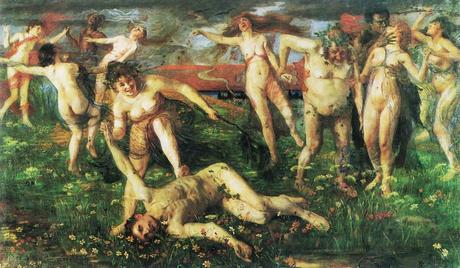With this in mind, I have decided to teach you about something because it's something I'd like to learn. I have chosen Ecstatic Poetry.
The Greek ekstasis, from which the word ecstasy is derived, translated as 'standing outside oneself'. This, to me, means that when you enter an ecstatic state, you step outside your normal framework and experience and are transported to a state which is separate from that state of mind, however temporarily. This needn't be as extreme as a Bacchanalian frenzy, or a drug-induced stupor. It can be that small shift in pace coupled with a flash of perspective which forces you to pause and re-read that last line, while your world moves a fraction to the left.

Bacchanale by Lovis Corinth (1896)
Paul Valery, in Edward Hirsch's How to Read a Poem and Fall in Love with Poetry, is quoted as saying, "A poet's function- do no be startled by this remark- is not to experience the poetic state: that is a private affair. His function is to create it in others." There are a range of poetic effects at our fingertips to invoke this ecstatic state in our readers. These tools are similar to those used in traditional prayer and hymn: the incantation of a poem in its rhythm and music, the momentary pause brought about by paradox, or the displacement of words, their rearrangement, that gives a fresh reading to a familar phrase.
The Sufi Poets are perhaps the best known of the ecstatic poets. And of the Sufi poets, Rumi is perhaps the most famous. His work has a transcendental, mystic quality to it but it is grounded in nature. In 2007, he was named the 'most popular poet in America,' - not bad for someone who was writing in the 13th century on the other side of the world.
Having done a little research now, I find I am quite fond of Daniel Ladinsky's interpretation of Rumi's The Way Things Should (2002). You can read the full poem online here. Here is the part of the poem which I find induces a feeling of ecstasy in me:
Love so needs to love
that it will endure almost anything, even abuse,
just to flicker for a moment. But the sky’s mouth is kind,
its song will never hurt you, for I sing those words.
What will our children do in the morning
if they do not see us
fly?
The shift, for me, from a traditional, inspiring verse to something which is ecstatic comes with the words 'the sky's mouth'. The words sink in up to that point but at this moment I pause. The voice becomes not that of the poet, but of a universal humanity. It's an invocation of universal love, or God. In that moment, when I sense the shift from the poet's voice to something bigger, that attempt to channel the universe, I feel my own heart lift. It's as if the poet's intention has traveled those 800 years to find me, right where I am, and remind me that I am loved. The directness of the intention directly affects my emotional state. This is Rumi. This is ecstatic poetry. I stand outside myself.
